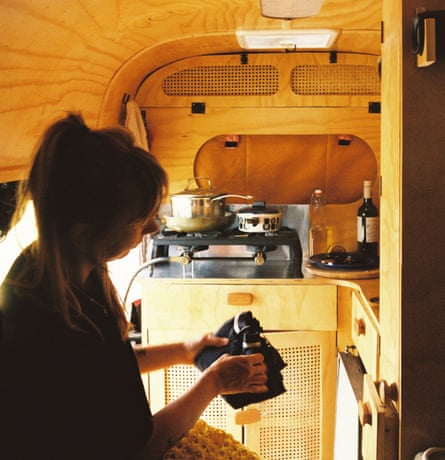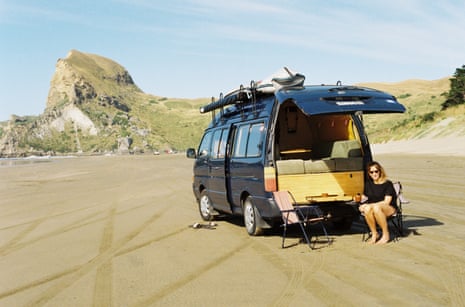When Bastiaan Van Druten moved to New Zealand from the Netherlands about seven years ago, a van was his first major purchase. He spent a week in his driveway, converting a HiAce into a livable home on wheels. Jamming in double mattresses, wardrobes, cabinetry, and concealed gas cookers into a few square metres, the design combined ingenuity with a willingness to sacrifice creature comforts.
For months, he and his partner travelled the country, visiting its small towns, waking up to surf and eat breakfast. “We noticed that New Zealand had a big van tourist scene,” he says. The country’s isolated coastlines and natural landscapes became suddenly accessible, and affordable. “The van really opens all of that up.”
But for Van Druten and hundreds like him, this season may be the last of the cheap, accessible “van life” summers – at least as they’ve known them. Anger at the unsanitary behaviour of some campers has made them a target, and new laws moving through parliament this year could spell the end of an era for many converted vans. The legislation would require the installation of standalone plumbed toilets that many say are too big to be fitted into their existing vehicles.
“It’s going to limit the kind of tourists that are still able to travel around New Zealand,” Van Druten says. “Because you know, the bigger campers they’re just way too expensive.”
‘Not part of our global brand’
For years, New Zealanders and overseas visitors – particularly the young, adventurous, and those on a strict budget – have embraced the van life, converting vans into DIY campers and taking to the highways to find out-of-the-way nooks and isolated beaches. Amid the growth of remote, laptop-based work, a growing cohort moved into their vans for long stretches and documented their travels, sharing tips for vehicle conversion alongside wanderlust-themed photographs of waking up to unspoiled sunsets and rooftop yoga. Fuelled by social media and word of mouth, the number of freedom campers ballooned, from the low tens of thousands in the early 2000s to just over 250,000 in 2019, according to New Zealand’s ministry of business, innovation and employment.
About five years ago, however, New Zealand’s freedom campers began to come under fierce public scrutiny, after a series of media reports when locals relayed stories of van-borne tourists defecating on their berms and beaches. The stories prompted a storm of outrage at freedom campers and made them a political target, firmly in the sights of tourism minister Stuart Nash. “They pull over to the side of the road and they shit in our waterways,” the minister infamously said in 2020, calling for a total ban on campervans without a self-contained toilet. “That’s not who we are as a nation, it’s not part of our global brand and I don’t think it’s the sort of tourist that New Zealanders want to see in our country.”

The new regulations are passing through the select committee stage to their second reading, and at this stage have the cautious support of all of the major political parties.
“There might be creative ways of doing it [plumbing in a toilet], but you’re wasting a third of your space or something for your toilet,” says Van Druten. “So all the smaller vans are basically write-offs for tourists and van life if those new regulations actually happen.”
The government has so far been unmoved by the plight of those smaller vans – saying they can always pay to use campgrounds if they wish to travel.
“There are hundreds of campgrounds and campsites,” said Nash. “They will gladly welcome all travellers, no matter what type of vehicle they have.”
While most political parties broadly support the bill, some have raised concerns about who will get caught up by the legislation. “The vast majority of New Zealanders who like to go camping in their vehicles and don’t have plumbed-in toilets … they can’t get certified,” said opposition National MP Todd McClay during a debate on the bill. “New Zealanders who have a campervan, who are responsible, and they travel around the country drinking good wine and seeing the sights, and, actually, there will be a great cost to them.”
That cost will be greatest for New Zealanders who have adopted vans as an affordable means to holiday, amid a growing cost of living crisis and an unaffordable housing market.

A driver for small-town tourism
Like many young New Zealanders, Jasmine Peate-Garrett, a high school teacher in Auckland, had spent years saving for a home. As New Zealand’s runaway housing market carried that goal out of reach, she decided to go for a van – a retired volunteer ambulance that she gradually converted into a traveling camper. “I was going to buy a house and then that wasn’t really achievable – I put that money on a van so that I could go do things, travel,” she says. “I’m on a budget, being a teacher, [but] I’ve been able to do quite a lot that I wouldn’t have been able to do otherwise.”
This summer, she drove through the west coast and Marlborough sounds, visiting family and friends along the way – and says that taking to the road shouldn’t be restricted to the full-size motorhomes that can accommodate a toilet.
“It should be accessible for New Zealanders to be able to visit these nice spots.”
For Van Druten, he objects to the implication that van-lifers aren’t valuable as tourists – saying that while they may not spend as much as cruise ship passengers, they take it to small communities that would otherwise miss out.
“It might be less money, but it’s more spread out,” he says “Because from my experience, tiny little towns usually have a dairy or a fuel station or the fish and chip shop – or maybe even a little gallery. That’s where the van-lifers end up.”

Comments (…)
Sign in or create your Guardian account to join the discussion